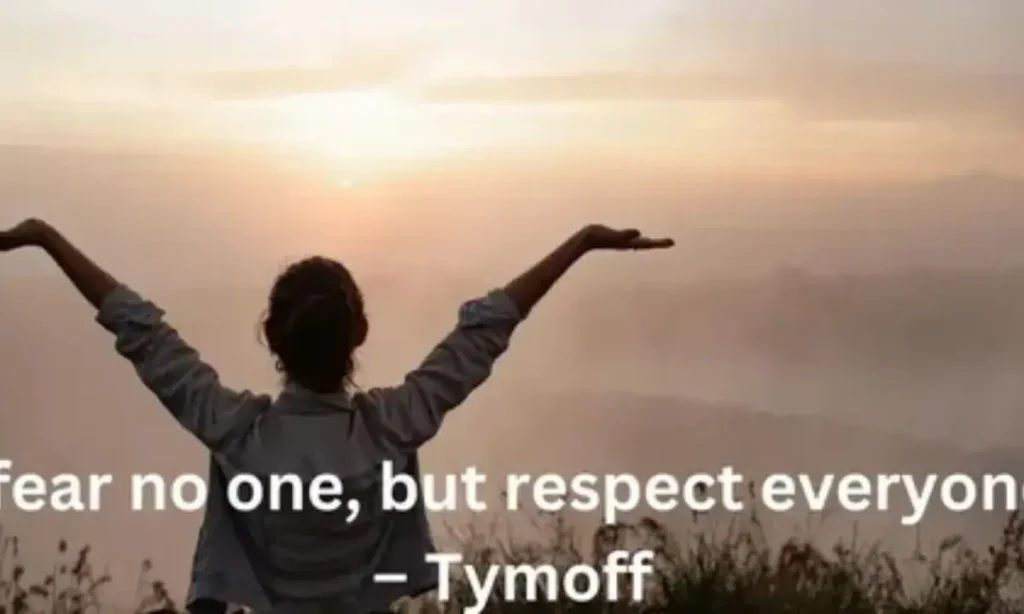Living by Tymoff’s timeless quote, “I fear no one, but respect everyone,” represents more than just words—it’s a powerful mindset that defines strength, humility, and balance. In a world where ego and insecurity often clash, this simple phrase reminds us of the profound harmony between fearlessness and respect.
This philosophy invites us to rise above fear while recognizing the dignity of others. It teaches that being confident doesn’t mean being arrogant, and being respectful doesn’t mean being weak. Let’s explore this concept in depth—its meaning, psychology, and application in real life.
Table of Contents
The Philosophy Behind Tymoff’s Words
Who is Tymoff and What Does He Stand For?
Tymoff is known for creating short, thought-provoking quotes that blend philosophy with modern wisdom. His message—“I fear no one, but respect everyone”—isn’t about dominance or superiority. It’s about maintaining inner strength without losing empathy.
This idea bridges two fundamental human values:
- Fearlessness, which fuels courage, leadership, and authenticity.
- Respect, which grounds us in humility, kindness, and understanding.
In a society obsessed with power and competition, Tymoff’s words stand as a quiet rebellion: you can be strong without being cruel.
Understanding the Quote: Breaking It Down
“I Fear No One” – The Essence of Fearlessness
Fear is one of the oldest human emotions. It protects us, but it can also hold us back. To fear no one doesn’t mean to ignore danger—it means not letting intimidation or insecurity control your life.
What True Fearlessness Means
- It’s courage in action, not recklessness.
- It’s about self-belief—trusting your values even when others doubt you.
- It’s about emotional stability—not reacting out of fear or anger.
Famous Examples of Fearlessness
| Person | Act of Courage | Impact |
|---|---|---|
| Nelson Mandela | Stood against apartheid despite imprisonment | Inspired global movement for equality |
| Malala Yousafzai | Advocated for girls’ education under Taliban threat | Became youngest Nobel Peace Prize winner |
| Martin Luther King Jr. | Spoke against racial injustice despite danger | Transformed civil rights history |
Each of these individuals feared no one—not because they were immune to fear, but because their principles outweighed it.
“But Respect Everyone” – The Foundation of Humanity
Respect is the invisible glue that holds society together. To respect everyone means acknowledging that every person has worth—no matter their status, beliefs, or background.
Why Respect Matters
- It builds mutual trust and understanding.
- It encourages healthy communication.
- It cultivates peace, both personally and socially.
Respect doesn’t require agreement—it requires recognition of shared humanity.
“Treat everyone with politeness, even those who are rude to you—not because they are nice, but because you are.” – Unknown
The Psychology Behind Fear and Respect
Understanding this balance requires a look inside the human mind. Psychology reveals how fear and respect operate on both neurological and emotional levels.
How Fear Works
- Fear originates in the amygdala, the brain’s alarm system.
- It triggers “fight, flight, or freeze” responses.
- Chronic fear leads to anxiety, avoidance, and loss of confidence.
How Respect Works
- Respect activates feelings of belonging and value.
- It stimulates the release of oxytocin, the “connection” hormone.
- Respectful interactions strengthen relationships and reduce stress.
| Emotion | Brain Area | Outcome |
|---|---|---|
| Fear | Amygdala | Defense, withdrawal |
| Respect | Prefrontal Cortex & Limbic System | Empathy, cooperation |
When fear dominates, relationships break down. When respect leads, cooperation and growth thrive.
The Strength of Being Unafraid
Courage is not the absence of fear—it’s the mastery of it. Fearlessness strengthens the mind and opens the door to personal freedom.
Benefits of Living Without Fear
- Confidence: You express ideas without worrying about judgment.
- Freedom: You stop seeking approval from others.
- Growth: You take risks and learn from experience.
Practical Ways to Build Fearlessness
- Face discomfort daily. Start conversations, tackle challenges, or try new skills.
- Reframe failure. Treat mistakes as learning tools, not defeats.
- Practice self-awareness. Recognize fears and question their logic.
“Courage is resistance to fear, mastery of fear—not absence of fear.” – Mark Twain
Fearlessness with a Touch of Respect
Confidence without respect is arrogance. Respect without courage is submission. The magic lies in balance—being bold yet kind.
How to Balance Confidence and Respect
| Fearless Trait | Respectful Counterpart | Balanced Expression |
|---|---|---|
| Assertiveness | Empathy | Speak your truth while listening to others |
| Independence | Cooperation | Stand alone when needed, collaborate when wise |
| Honesty | Tact | Be direct, but never cruel |
| Strength | Humility | Know your worth, but value others equally |
True leaders blend both. They stand tall without stepping on others.
Example: Leadership in Practice
A great manager doesn’t command through fear. They inspire through respect. They’re not afraid to make hard calls—but they also listen to feedback. This blend creates trust, loyalty, and innovation.
Applying Tymoff’s Principle in Everyday Life
Tymoff’s philosophy is practical—it applies to daily decisions, relationships, and careers. Here’s how to make it real.
At Work
- Speak confidently during meetings, but allow others to voice ideas.
- Disagree professionally, not personally.
- Respect colleagues’ time and efforts.
A workplace thrives when people fear no one but respect everyone.
In Relationships
- Communicate boundaries without aggression.
- Listen actively before responding.
- Show appreciation, even in disagreements.
Healthy relationships are built on mutual respect and open communication.
For Personal Growth
- Reflect on moments where fear controlled your choices.
- Replace fear-based reactions with calm, respectful actions.
- Surround yourself with confident, respectful people.
Daily Practices
| Action | Purpose |
|---|---|
| Journaling fears | Increases self-awareness |
| Gratitude lists | Builds empathy |
| Conflict reflection | Teaches humility and patience |
Misinterpretations and Misuse of the Quote
Many people misread Tymoff’s words. Let’s set the record straight.
Common Misconceptions
- “Fear no one” doesn’t mean disrespect authority.
- “Respect everyone” doesn’t mean accept injustice.
- It’s not about dominance—it’s about self-mastery.
The Danger of Misusing Fearlessness
Without respect, fearlessness turns into ego. It leads to confrontation and loss of credibility. True fearlessness requires self-control, not aggression.
“He who conquers himself is the mightiest warrior.” – Confucius
Tymoff’s Broader Message and Modern Relevance
Tymoff’s philosophy aligns with many timeless schools of thought—stoicism, mindfulness, and emotional intelligence. In today’s digital age, where online debates often turn toxic, this mindset is more relevant than ever.
In Leadership
Great leaders—like Mahatma Gandhi or Maya Angelou—demonstrated that true power doesn’t come from fear. It comes from respectful influence.
In Society
- Promotes inclusivity and equality.
- Reduces social polarization.
- Fosters open dialogue and understanding.
In Mental Health
Respecting others while mastering fear reduces anxiety, increases resilience, and builds emotional balance.
Case Study: Fearlessness and Respect in Action
The Nelson Mandela Example
Mandela faced decades of imprisonment but emerged without bitterness. Instead of vengeance, he chose forgiveness and respect—even toward his former enemies.
Outcome:
His approach unified South Africa and transformed him into a global symbol of peace.
| Quality | Example from Mandela’s Life |
|---|---|
| Fearlessness | Challenged apartheid regime |
| Respect | Advocated reconciliation instead of revenge |
| Impact | Fostered unity and inspired generations |
Key Takeaways
| Principle | Meaning | Application |
|---|---|---|
| Fearlessness | Confidence to stand for truth | Speak your beliefs even under pressure |
| Respect | Recognizing others’ worth | Treat all with dignity, regardless of disagreement |
| Balance | Courage + Humility | Be bold, but stay kind |
The core message is simple yet transformative: Be brave enough to stand firm, and wise enough to stay gentle.
Living by Tymoff’s Philosophy
To live by “I fear no one, but respect everyone” is to walk the fine line between strength and compassion. It’s the mindset of the emotionally intelligent and morally grounded.
Here’s how you can start:
- Stand your ground, but don’t raise your voice.
- Respect others’ opinions, even when you disagree.
- Be assertive, but never arrogant.
- Lead with empathy, not fear.
In doing so, you embody Tymoff’s truth—a fearless spirit guided by a respectful heart.
“Be strong enough to stand alone, smart enough to know when you need help, and brave enough to ask for it.”
FAQs About Tymoff’s Quote
What does “I fear no one, but respect everyone” mean?
It means having courage without arrogance—standing firm in your beliefs while honoring others’ dignity.
Is Tymoff a real philosopher?
Yes. Tymoff is known for modern philosophical reflections on life, self-growth, and moral intelligence.
How can I apply this quote in daily life?
By practicing self-confidence, empathy, and active listening—especially in conflicts or disagreements.
Can someone be fearless and respectful at the same time?
Absolutely. True fearlessness grows from inner peace, not aggression. Respect and courage complement each other.
Related Quotes and Lessons
| Quote | Author | Lesson |
|---|---|---|
| “Courage is not the absence of fear, but the triumph over it.” | Nelson Mandela | True courage transforms fear into strength. |
| “Respect is earned, honesty is appreciated, trust is gained, loyalty is returned.” | Unknown | Mutual respect sustains human relationships. |
| “Humility is not thinking less of yourself, it’s thinking of yourself less.” | C.S. Lewis | Confidence should coexist with modesty. |
Final Reflection
Tymoff’s quote “I fear no one, but respect everyone” isn’t just a statement—it’s a lifestyle. It challenges us to confront our fears, rise above ego, and treat others with humanity.
In a time where pride often overshadows empathy, adopting this mindset can reshape not just individuals, but entire communities. The real strength lies in balancing courage with compassion, confidence with kindness, and fearlessness with respect.
So, as you go through life, remember:
Don’t let fear silence your truth—and don’t let pride silence your respect.



